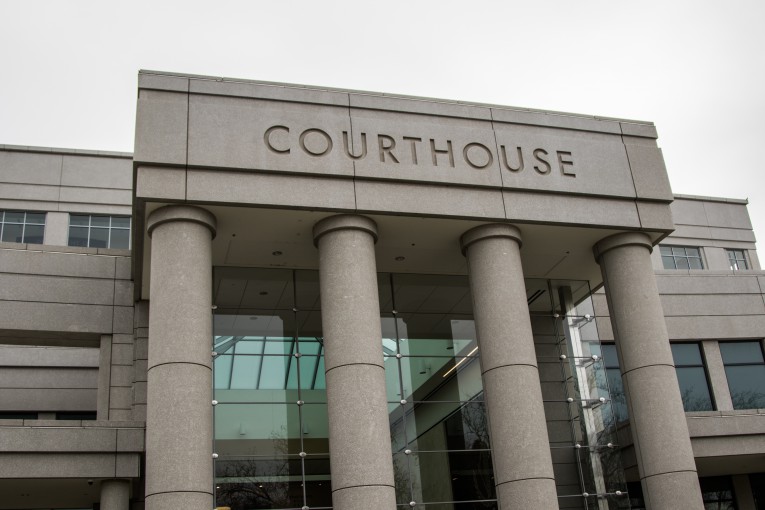
 By Sarah Senan and Jagjit Bath
By Sarah Senan and Jagjit Bath
“It is a very stimulant drug, the most dangerous of all stimulants. It can produce psychotic experiences, very much outside of reality,” said Dr. Stancil Johnson about methamphetamine. He was brought by the People to testify in their case against Alamar Cyril Houston. Mr. Houston is charged with attempted murder, assault with a deadly weapon, hit-and-run and driving under the influence in the June 30, 2015, incident on South River Road near Clarksburg, where he hit and injured three bicyclists.
The People are saying that Mr. Houston showed signs of being intoxicated with methamphetamine, whereas the defense is arguing that a negative blood sample for the drug shows that there were no signs of methamphetamine in Mr. Houston’s bloodstream and it was a psychotic breakdown that caused his behavior. Although the defendant is pleading not guilty by reason of insanity due to his untreated mental illness, Dr. Johnson’s testimony provided evidence to the court that Mr. Houston was not mentally ill but rather under the influence of methamphetamine.
Dr. Johnson is a psychiatrist in Carmel, California, and his career in private practice began in 1972. Dr. Johnson previously held a contract with California Forensic Medical Group (CFMG), and was with them for 13 years up until 2015.
Dr. Johnson’s experience includes diagnosing schizophrenia and substance abuse disorders, also known as drug use disorders. During his time with CFMG, he saw a number of patients each week and has a great deal of experience identifying and observing drug use.
Deputy District Attorney Garrett Hamilton asked Dr. Johnson if he had an encounter with defendant Alamar Houston in 2015. Dr. Johnson responded in the positive. However, when asked to identify Mr. Houston, Dr. Johnson was unable to say for certain if the man present in the courtroom was the same man he treated.
The uncertainty may or may not be due to the practice of telepsychiatry. Telepsychiatry is a practice used to deliver forms of psychiatric assessments, more often than not, through videoconferencing. All of Dr. Johnson’s evaluations of Mr. Houston took place through video.
Dr. Johnson explained that the goal of telepsychiatry, pertaining to Mr. Houston, was to see whether or not a psychotic issue was present – and if there was, whether or not CFMG had the proper means and medication to help treat the defendant.
Additionally, part of Dr. Johnson’s role was to document statements made and note any significant observations. His initial evaluations of in-custody patients would reveal what brought the inmate to jail, how they behave, if they are on medication or experiencing any problems, and if any abnormal behavioral activity is present. Dr. Johnson testified that all of his notes include accurate observations of Mr. Houston.
Dr. Johnson explained that his observations led him to soon form an opinion about Mr. Houston’s symptoms. Dr. Johnson believes that the primary issue Mr. Houston suffered from was substance-induced psychosis, a disorder where psychosis can be attributed to substance use. Furthermore, individuals who experience secondary psychosis do not see the rest of the world in the same way that people in a normal state do.
Dr. Johnson testified that Mr. Houston was “hearing voices coming from out of his mouth.” Dr. Johnson explained, “The nature of the things he (Houston) said seemed to make him seem sicker than he was.” Dr. Johnson stated that Mr. Houston’s bizarre complaints were factitious and not related to schizophrenia. The voices that Mr. Houston heard were “so bizarre that the thought (came up) that perhaps they were made up by him because of his legal circumstances.” Mr. Houston’s episodes led Dr. Johnson to believe that Mr. Houston was psychotic because he was under the influence of meth, and not because of mental disorder.
By Jagjit Bath
The second witness of the afternoon was Dr. Jason Roof. Dr. Roof is a psychiatrist at UC Davis. He is adept at forensic psychiatry, a practice that brings medical education into the courtroom. He has previously provided diagnoses and treatments in a jail setting. Dr. Roof has seen thousands of patients in jail, and has been able to detect “malingered symptoms.” Malingered symptoms can pertain to treating something that is not there or can be noted as feigned schizophrenia symptoms. This is when a patient pretends to be mentally ill.
Dr. Roof explained about the topic of psychotic sensory overload. If an individual is diagnosed with a psychotic symptom it does not mean that they are psychotic or detached from reality. Having just one of the symptoms does not lead to the conclusion that the individual is utterly detached from reality, because they can still properly function in everyday activities.
At redirect examination, Dr. Roof also mentioned that he used “SIRS” test results to figure out if Mr. Houston was faking his symptoms or if he was really mentally sick. Dr. Roof explained that SIRS stands for Structured Interview of Reported Symptoms, and it consists of 172 questions about a variety of things which can help the doctors to figure out if someone is pretending to be sad or psychotic. Dr. Roof mentioned that Mr. Houston was not being honest and was causing scenes in the hospital to get attention from the medical team, such as reporting that he saw “colorful dragons and flashing lights.” He also used his own fecal material on his face. Dr. Roof said that when he asked Mr. Houston why he rubbed his poop on his face, he responded that “a spirit told him to do so…” Dr. Roof said the SIRS test report suggested that Mr. Houston was a victim of malingered symptoms.
Mr. Hamilton asked Mr. Roof, “Did you form an opinion of why he was rubbing poop on his face?” Dr. Roof replied by saying, “Yes, I do feel that he wanted to appear very ill to us,” and that was why he was doing things to get their attention.
The trail will resume at 9:15am in Department 14.